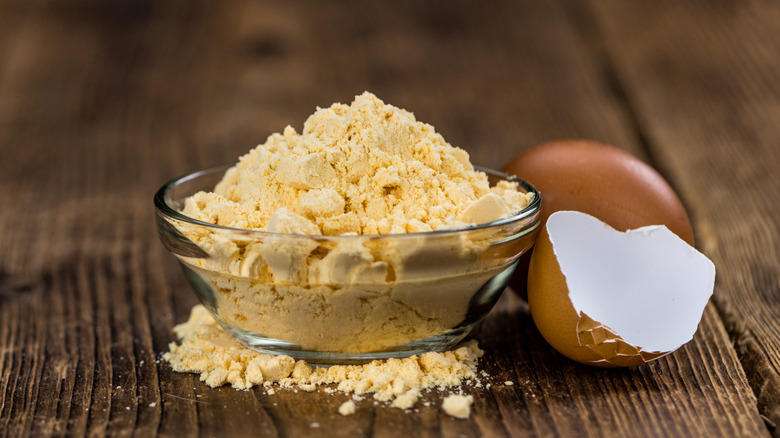Powdered Eggs Are The Foolproof Substitute At Empty Grocery Stores
Americans who love an egg for breakfast have undoubtedly noticed the effect of the 2022 avian flu outbreak on egg prices and availability. With a major loss of hens, due to the largest breakout of the disease in U.S. history, shortages have significantly driven up the cost of a single carton. In January of 2023, egg prices reached a shocking $4.82 per dozen (via the United States Bureau of Labor Statistics).
As of March 2024, national egg prices have lowered somewhat, thanks to a brief summertime respite from reported avian flu cases in 2023. However, cases began to rise again in fall of that year, and prices are now following suit. And high prices aren't the only problem — shoppers throughout the country have also encountered empty shelves or store-imposed limits on the amount of cartons they can purchase at one time. Luckily, there is a solution for omelet-lovers or avid bakers: powdered eggs.
Powdered eggs are simply eggs that have been dehydrated. They're packaged in airtight containers and have a remarkably long shelf life, which means that you can keep them on hand to use regularly — a huge boon during those times when you can't get your hands on a carton at the grocery store. Learn to use it, and this cheap, easy-to-find egg product can be a savior for your cooking and your wallet.
Why use powdered eggs?
Powdered eggs are almost as easy to use as fresh (and may be easier, if you're bad at cracking regular eggs). All you need to do is rehydrate the powder according to the package directions, then cook them however you like. You can even use them in recipes for baked goods, sauces, or anything else that calls for fresh eggs (and you might not have to rehydrate them for such purposes). And since they're made from nothing but real eggs, the dehydrated version packs the same punch of nutrients.
Dried eggs are also fairly easy to find. Even if they're not sold at your local grocery store, you can order them online from various retailers, unlike fresh eggs. Another bonus is that they're easy to store at room temperature, freeing up space in your fridge. And if you're a frequent traveler, powdered eggs are great to take on the go. You can add the powder to smoothies for a protein boost, or quickly cook them over a campfire or in your hotel's microwave.
As for flavor and texture, you may not notice much difference in your baked goods or recipes that don't mainly feature eggs, but they may not taste exactly the same in scrambled eggs or an omelet. While some online reviews for powdered eggs rave about them, others are less enthusiastic. As with any store-bought product, you may need to experiment with various brands to find the one that you prefer.
What else to consider when substituting for fresh eggs
Price is a key factor in determining if you should buy powdered eggs. Since the cost of fresh eggs is always fluctuating, you'll need to compare prices in real time before you shop. Some powdered egg brands can be less expensive than fresh, depending on the current cost of a carton — in fact, that's why some restaurants opt to use them over fresh eggs, shortage or not. However, other brands can be significantly more expensive, making it important to look at the price versus the amount of servings in the package.
While powdered eggs are a fairly accessible and affordable replacement for fresh, if you're still not sold, there are other egg substitution options, as long as you're not looking to whip up a dish like scrambled eggs or quiche. For baking, you can mix flaxseeds with water to make a "flax egg" with similar binding properties, or you can repurpose the water in your can of chickpeas to use as a binder, as a base for a vegan meringue, and more. And if you're looking to use up a giant bag of chia seeds, those can be mixed with water to make a gelatinous egg replacement, too. Finally, you can purchase egg replacers, which are egg-free, but do the same job in all of your baked goods, sauces, and other recipes.



